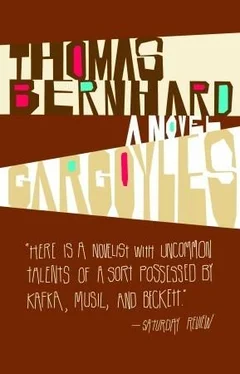All through the drive through the Söding Valley my father talked about my mother. His reveries centered on her, he said, rather than his dreams. Her presence often steadied and encouraged him during periods that seemed outwardly to be fully taken up by his medical work. As a result he had been able to reach a clear view of death as a fact of nature. Now he understood her, who had lived beside him so many years and been loved but never understood. You were never truly together with one you loved until the person in question was dead and actually inside you.
From the day of the funeral in Afling, my father continued, she had often asked him to take her along on his calls. Nowadays this desire on her part no longer seemed so incomprehensible. In the nature of things it had not been possible for her to study the suffering and torment of the world, but from the day of the funeral in Afling on, this subject was constantly on her mind. During this period he had often spoken with her about us children, above all about the difficulty of channeling parental affection into educational lines. But she used often to say to him that we seemed to her more the children of the landscape around us than of our parents. Holding this view, she had felt us, my sister to an even greater degree than myself, to be creatures sprung entirely from nature, for which reason we had always remained alien to her. Because the three of us were completely helpless after her death, my father said, and my sister and I were in the most dangerous phase of development, she twelve and I sixteen years old, he had thought of remarrying. “In fact the thought came to me during the funeral itself,” my father said when we were already in sight of Stiwoll. But the idea had been more and more repressed by our mother inside him .
As he said this, I remembered the letter I had written to him a few days ago, in which I had tried to sketch the uneasy relationship among us three, between him and me and between him and my sister and between me and my sister. I had written to him fancying that I would receive an answer, and now I realized that no such answer would ever be forthcoming.
My father will never be able to answer the questions I asked him in that letter.
Our relationship is difficult through and through, in fact chaotic, and the relationship between him and my sister and between me and my sister is the most difficult, the most chaotic of all.
In the letter I had tried to define certain things about our relationship by citing seemingly simple but to me extremely important details. In the writing I had taken the greatest pains not to offend my father. Nor to offend anybody. From my years of observation I found it fairly easy to sketch a picture of us that could be considered truthful from all three sides. My letter had been composed very calmly; I did not allow myself to show any excitement, although I did not evade the central matters that concerned me, such central matters, posed as indirect or direct questions, as for example who was to blame for my sister’s most recent attempt at suicide, or for my mother’s early death. I had long wanted to write such a letter and had started on it repeatedly, but had each time been overcome by doubts about the usefulness of this sort of accounting. It had always been impossible for me to write to him. Each time I would immediately become aware of the awkwardness of suddenly expressing in black and white things that for years had only been private thoughts, speculations. Then too I was checked by a reluctance to bring up possibly long-forgotten matters as essential evidence for my view of us. For I would have had to proceed with sincerity and therefore ruthlessness, and yet show consideration for all concerned. That, too, made such a letter impossible for such a long time.
But on the previous Monday it had suddenly become easy for me to write the letter. In a single draft of only eight pages I set forth my analysis of the whole complex, which culminated in questions of whether there was any way to clarify the condition we were all in, and whether our relations could be improved. When I was done, I looked the text over several times and found nothing that should dissuade me from mailing it. My father must surely have received the letter by Tuesday moining. But up to now he had not so much as mentioned the matter, although it was apparent from his whole manner that he had not only received the letter punctually, but had also read and studied it with the greatest attention and had not forgotten it.
In Stiwoll, too, as I saw the moment we drove into town, my father was very well known.
Thanks to his excellent memory, he could address everybody he met by name. He also knew the situation of every individual.
Whenever he felt that I needed some pertinent information about someone with whom he had exchanged a greeting or a few words, he gave me a brief characterization.
We walked rapidly through the town to visit a certain Bloch, a dealer in real estate. He liked the man, my father said. Married to a woman of fifty, his own age, the realtor voluntarily stayed on in this dull mountain community, whose natives were by nature hostile to him, and found his consolation in the pleasures of his business.
There was another doctor in Stiwoll, my father said. But Bloch had relieved this doctor of the lasting shame of having to treat a Jew, which Bloch was, by consulting my father. Bloch’s father had also lived in Stiwoll.
Between Bloch and my father, despite the distance of fifteen miles and the intervening high mountains, there had developed a friendship that had, as my father put it, “something philosophical about it.” Bloch, he said, occupied the house that had been his father’s, who had been killed by the Germans.
As I saw at once, this was one of the finest houses in Stiwoll, on the right side of the street that led from the main square. The façade itself pleased me precisely because it looked so neglected, gray in keeping with its actual age, and also rather battered from the last war. As we entered the freshly plastered vaulted hall, I instantly decided that Bloch had good taste.
He would visit Bloch at least once a week for a longish talk, my father said, a discussion that he or Bloch took turns at leading. I might find it hard to believe, my father said, considering the general tenor of things in Stiwoll, but the two of them conducted “autopsies on the body of nature” as well as “on the body of the world and its history.” They discussed “comparative political science, applied natural history, literary criticism,” and dealt “unsparingly with society and the state.” But in general the main theme in Bloch’s house was politics, and they tended to talk about people more in regard to their political than their private beings. Meeting in a first-floor study, they conducted an analysis of the world on the most stringent intellectual principles, and left no margin for any illusions whatsoever. Most of the time the arts were rather scanted, my father said, but occasionally they would turn to them out of courtesy to Bloch’s wife.
Bloch was sitting in an office to the right of the vestibule, separated from it only by a glass partition, and dictating with obvious excitement to his secretary. As he later mentioned, he was addressing a letter to the Voitsberg surveyor, whom I also knew. My father tapped on the office window, and Bloch came out. He greeted us pleasantly and led us at once into the study on the second floor. The fact is that nowhere in a rural area have I ever seen so many books all together as in Bloch’s library. Moreover, as I observed, they were all well used, and were not here for their so-called bibliophilic value, which people in German-speaking countries set such ridiculous store by — aside from a Latin edition of the Nuremberg physician Schedel’s world history, of which there are only a few copies in the whole world.
Читать дальше












